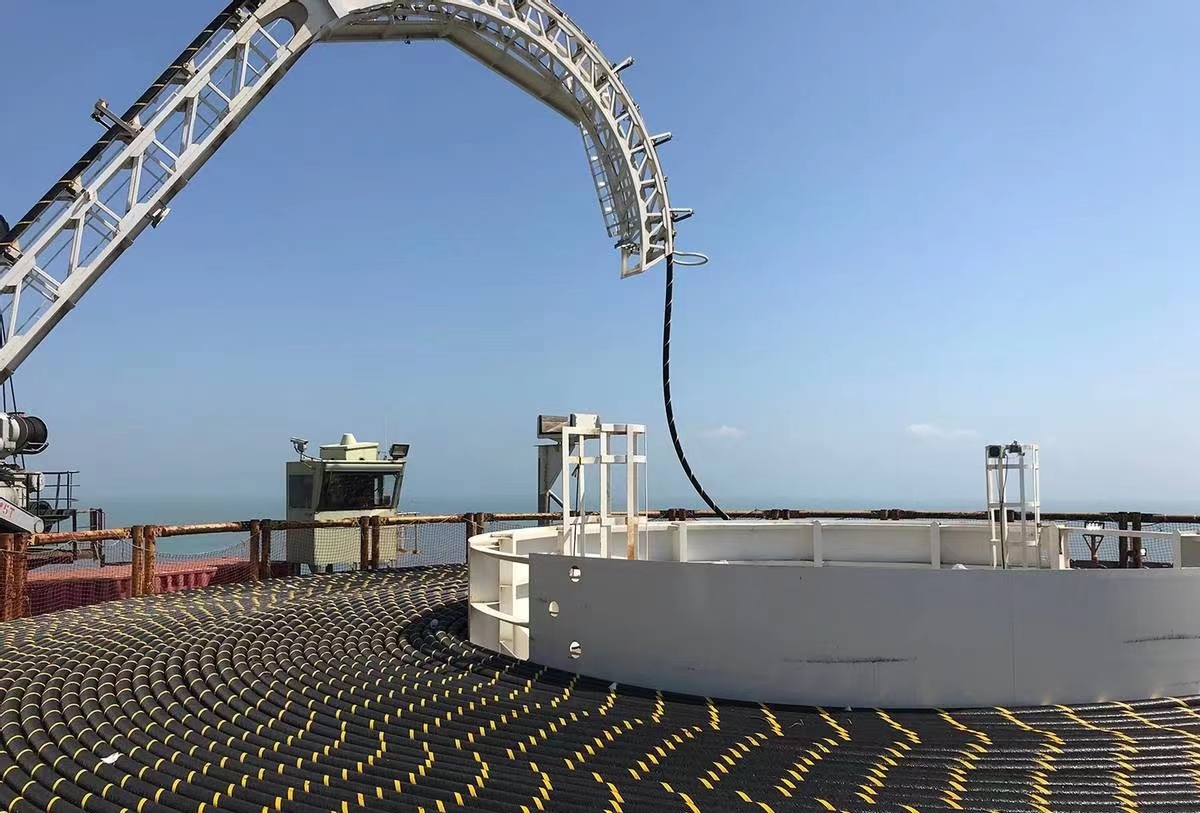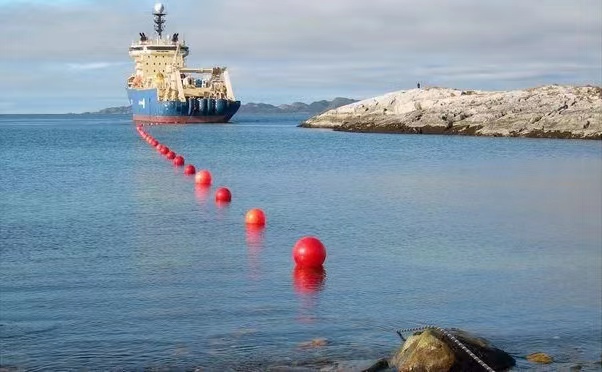

The submarine cable is composed of polyethylene layer, polyester resin, aluminum tube, paraffin fiber bundle and other materials. Submarine cables play an important role in our life today. After the Nord Stream pipeline explosion, the Norwegian Armed forces deployed F-35 fighter jets, as did the UK, France and Germany! From this incident, we can see the importance of submarine cables.
According to CCTV News, on October 4 local time, the Norwegian Radio and Television Corporation reported that the submarine cable between Lofoten Henningsvær and Svolvær was broken due to a problem.


The rupture occurred 500 metres east of Henningswell. Work is currently underway to repair the cables, which will take several days to a week. The Norwegian power company Lofotkraft said it did not yet know what caused the accident.
On October 4, local time, the Norwegian Armed Forces F-35 fighter jets patrolled the Norwegian coast and monitored oil and gas facilities after the Norwegian government announced enhanced security preparations, NRK reported.
Britain has also sent a frigate to patrol near the North Sea gas pipeline. Britain will also buy two specialist ships to protect such pipelines, the first of which will be operational by the end of next year.
A number of European countries are working to strengthen the security of undersea cables and pipelines after a powerful explosion at the Nord Stream gas pipeline in the Baltic Sea last week.
According to CCTV News, on September 30 local time, the Norwegian Armed forces have stepped up patrols of oil and gas facilities in the area to ensure security following the leak of the Nord Stream gas pipeline, according to the NRK.
Γερμανία, France and Britain will help Norway patrol the waters around offshore oil and gas platforms in case they are damaged, Norwegian Prime Minister Jonas Gahr Stotler said Sept. 30.
European countries stepped up purchases of electric blankets and hot water bottles after the Nord Stream gas pipeline was damaged. In July alone, the 27 EU countries imported 1.29 million Chinese electric blankets, up nearly 150 percent month-on-month.
Some media interview Yiwu dealers learned that only in August “Shanghai Yongzi” hot water bag export to Europe orders have doubled several times.
As a result, some people on the Internet joked: “Europeans are buying up Yiwu’s electric blankets.” The only thing an electric blanket and a hot water bottle have in common is electricity. Without electricity, an electric blanket is not as good as a towell. it’s just a broken blanket.
Without electricity, you can’t boil hot water, so how do you get it into a hot water bottle? So electricity has become a natural gas shortage.
The only way for Europeans to survive the winter. So submarine cables are very important.
The material requirements of submarine cables are very high, requiring strong structure and light material. When you think of a light metal, the first thing you think of is aluminum.
But you can’t use aluminum on the ocean floor, because the water will react with it and make the cable unusable. Need to overcome the external environment, but also need to ensure the stability of information transmission, just the material on the great effort, can be used for about 25 έτη.
Submarine cables are divided into two types of onshore and off-shore equipment, and the division of labor of the two types of equipment is also different. All data, images, and voice are packaged together and transmitted by onshore equipment; Subsea equipment is mainly used for signal processing, transmission and reception.
As technology advances, most undersea cables are now fiber optic cables, not only for Internet data, but also for cloud computing. It is also the medium of network communication between countries around the world.
Don’t underestimate the submarine cable, the connection between countries, financial, stock and other information depend on it. You could also call it the road to economic connectivity.
As a means of information transmission, submarine cables play a huge role in the global Internet era. Submarine cables were first invented in 1850, 100 years before the Internet existed. Currently, there are 500 submarine cables around the world. Submarine cables play a huge role in international communications. More than 90% of the world’s communication data are transmitted through them. More than 40 countries rely on optical cables for economic information communication.
In 1970, the United States spent $30 million to build an undersea fiber optic cable. That’s a lot of money to spend on just one fiber, not to mention how much value it creates. The global cable, carrying huge value of information, holds the lifeblood of virtual economy.
In 2018, there was a cable cut. Mauritanil’s submarine cable was cut, and it seemed to evaporate from the world and never be heard from again. If the two countries go to war, the cutting of the submarine cable would be a fatal blow. It could result in the loss of reception of vital war equipment, such as aircraft. The global Internet could be plunged into darkness and fear if undersea cables are damaged, experts say.
Although the advantages of undersea cables and optical fibres are great, they are vulnerable. To “survive” at the bottom of the ocean, you need to wrap yourself in a variety of materials to protect you from corrosion, sharks, anchors, and more. Some of the cables are in deep water and some in shallow water.
Although the fiber inside is heavily protected, it cannot withstand the shock of an earthquake. When a powerful earthquake struck Taiwan in 2006, it knocked out power cables in several countries and made it impossible to access foreign websites. It has a high probability of being damaged by human impact. It’s not indestructible.
Laying cables under the sea is a very difficult business. It costs a lot of money and takes a long time to lay a cable. Repairing a broken cable on the sea floor is much more difficult than laying it!
Πρώτα, the longest cable currently reaches 39,000 kilometers, connecting more than 30 countries. If the cable suddenly cuts the signal, it’s not easy to figure out what’s damaged or broken. If the damaged part is in shallow water, repair work can be done manually; If the damage is deep in the ocean, even finding the damage is a big job.
If a cable is cut, a reflector is first used to locate the damage, and an underwater robot dives to the ocean floor to detect it. This part is extremely difficult to do manually. Once the damage has been identified, a robot will be used to dig the cable out of the water, which will then be inspected, repaired and connected by a human.
And it takes a lot of skill to connect the severed cables. Once the U.S. cable is cut by Russia, not only will the damage be huge, but it will take a long time to repair.
There may be a lot of people don’t understand, why to lay a cable under the sea? Since it’s expensive and difficult to repair, can’t you lay cables on land?
The main reason is that the seabed has no interference from external optical and magnetic waves, which makes the signal noise relatively higher, making the transmission speed faster. We live on a planet where oceans occupy a much larger area than land, making up 71% of the Earth’s surface.
On land we’ve built all sorts of buildings, buried all sorts of pipes, and very little has been developed. It’s much easier to lay a cable under the ocean than it is on land.
Many countries are far away from each other, and most of them are separated by sea. It is really difficult to connect with the land. It is more convenient to connect from the sea floor.
With the development of science and technology, offshore wind power generation, information transmission, oil extraction and other operations are slowly being carried out. In the future, submarine cables and optical cables may be used for more than just information transmission.
Both at home and abroad, the research and development of submarine cables are attached great importance. The world is now focusing on the development of new energy industry, which has a huge market space.
When people hear the term mineral insulated cable, many immediately think of harsh environments like…
As telecommunication networks and power transmission systems grow rapidly, the demand for reliable and cost-effective…
In large-scale oil and gas projects, industrial cables are not just accessories—they are the "nervous…
Στον κόσμο των ηλεκτρικών συνδέσεων, cable lugs—also known as cable ears or cable terminals—are…
Κατά την επιλογή του σωστού καλωδίου από καουτσούκ για ένα πρόγραμμα ηλεκτρολογίας, it is critical to…
Dear partners and customers: January 29th, 2025 is the Chinese Lunar New Year – Spring…